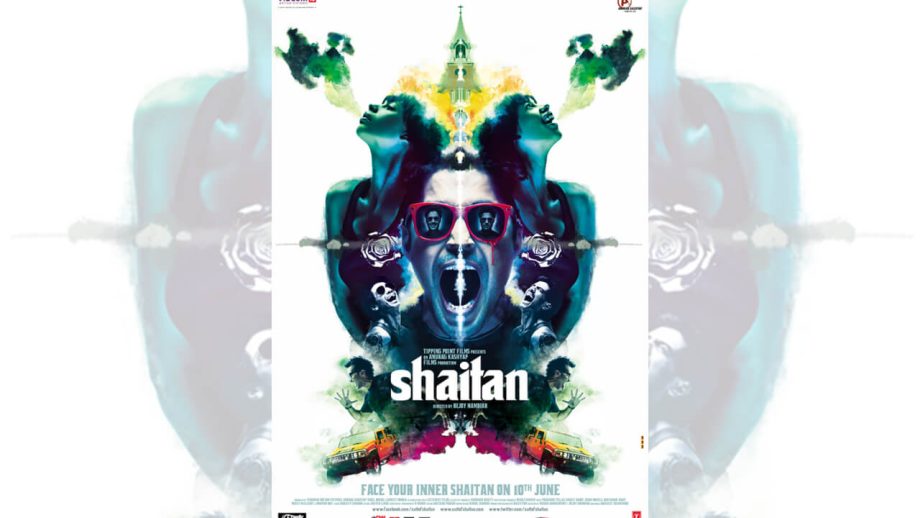If there were any doubts about 2011 being the year of reckoning for Indian cinema, “Shaitan” with its mounting mood of ricocheting restlessness puts all doubts to rest. The skillful interweaving of strong storytelling and powerful performances is underpinned by a wild sense of humour that shows up at the oddest of places to remind us that cinema is not about following all the punctuation rules of storytelling. It’s about knowing when and where to rev up the drama to just that right pitch to carry us into a tripped-out world of hedonism and redemption.
This stunning tale of five misguided youngsters (no relation to Anurag Kashyap’s “Paanch” as reported) from the uppercrust displays a flair for unleashing an energy that leaves us breathless with anticipation. It’s tough to keep up with the film’s unbridled zest for momentum. From the opening montage showing poignant scenes from Kalki’s childhood with her troubled mother to the dying moments when the five protagonists are rendered either dead or damned or both, this work of pop-art just sweeps you into its furious folds of angst and anxiety.
First-time director Bejoy Nambiar doesn’t waste time in introducing the characters. We know them almost instantaneously.
A huge USP in many recent films set in the madness of the urban jungle is the raw energy of the outdoor locations. “Shaitan” assails you with the tension and the anxiety of people on the run. The camera is never inattentive. The street scenes and the sound-design are absolutely brilliant.
With devilish dexterity, we are taken into the homes, minds and fetishes of the five youngsters. In the first 25 minutes, Nambiar constructs a cool case study for the young quintet’s self-destruction. Then he watches the trendy fund-flush world of designer labels and other costly indulgences come apart at the seams.
Some of the scenes are deliberately designed to exude the terror of over-indulgence. Fortunately, most of the pay-off happens almost of its own volition.
“Shaitan” is a morality tale with a gut-wrenching twist. It dares to venture into the psychedelic world of the affluent urban young and then rips the veil of ecstasy apart to reveal the emptiness that defines every life lived on the edge of extravagance. Miraculously, “Shaitan” is a morality-tale that doesn’t moralise. It creates a world of self-destructive pleasure pursuits but doesn’t sit judgement on that world.
Nambiar gets terrific support from his cinematographer (R. Madhi) and editor (Sreekar Prasad) in creating a world that is cinematic and dramatic and yet real enough. Comparing Nambiar’s style of storytelling to Quentin Tarantino, Guy Ritchie or Nambiar’s mentor Mani Ratnam or Anurag Kashyap would be as self-defeating as comparing “Shaitan” to the other recent films on the young and the doomed.
Nambiar creates his own world where the quirky and collapsible are constantly jostling for attention. The narrative is loose-limbed, yet never flabby or self-indulgent. The film exudes the unbridled energy of a rock song but doesn’t forget to include a melodic underbelly in its compositional range. The madly idealistic cop’s (Rajeev Khandelwal) disintegrating marriage to a woman (Sheetal Menon) who just won’t talk remarkably creates a space for itself in the stifling bustle of this film’s main action.
A special word for debutants Shiv Pandit, Gulshan Devaiah, and semi-newcomers Neil Bhoopalam, Kalki Koechlin (her malice-in-blunderland act is haunting) and Raj Kumar Yadav — the “Ragini MMS” hero in top form here as corrupt cop. Also Pavan Malhotra as a senior police officer.
As for Rajiv Khandelwal as a twisted cynical successor to Amitabh Bachchan’ angry cop from “Zanjeer”, this is a skilled actor with ample star-potential.
“Shaitan” is a work of many virtues about the myriad vices that plague the life of the young and the rich. It doesn’t preach. It doesn’t use Hindi abuse words for effect. And the camera chooses to focus on sagging moral values rather than heaving breasts.
The music blends into the volatile theme. There is a quaint remix of the Dev Anand-Mohd Rafi-S.D. Burman classic “Khoya Khoya Chand” as an ironical homage to the independence that the past generation fought for, and got.
“Shaitan” looks at the sub-zero level of moral values among a section of the urban young with a whimsical zest for a new kind of cinematic voice that is far removed from films about cops and desperados that we’ve come to know over the years. This is a defining moment in Indian cinema.

